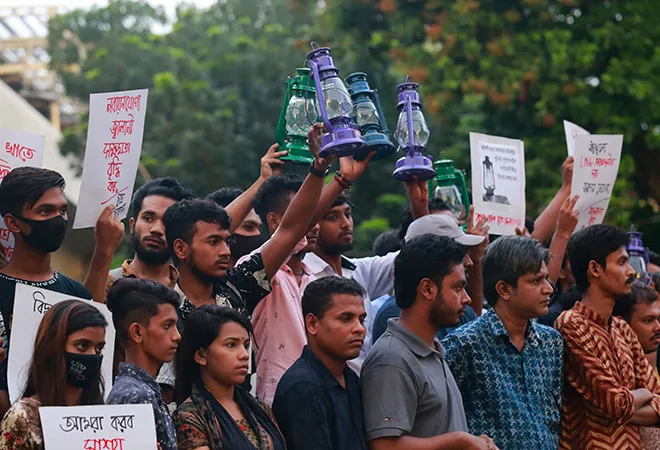
In early October, Bangladesh suffered from a grid failure that triggered a blackout across 75-80 percent of the country. This latest development is a mere indicator of the looming power crisis in Bangladesh, where long power cuts and load-shedding have become common. The intermittent electricity supply has stunted production in key export industries, which are crucial for bringing in much-needed foreign exchange. This crisis threatens to push Bangladesh into a cycle where it is unable to secure enough energy imports due to a shortage of foreign reserves—having long-standing strategic implications with its energy partners.
< style="color: #163449;">The power crisis and its economic implications
A combination of global and domestic factors has led Bangladesh to the present crisis. Close to 85 percent of the nation’s electricity is generated using fossil fuels like natural gas and oil, with the former being the primary source. An exponential rise in oil and gas prices owing to Russia’s energy war, OPEC+ oil supply cuts and the European Union Embargo on Russian crude oil has resulted in surging inflation and unsustainable energy import bills. Thus, compelling Bangladesh to stop gas purchases and shut down several diesel-run power plants. Dhaka’s scant attention to renewable energy and policies like capacity payments have exacerbated this energy crisis too.
< style="color: #0069a6;">An exponential rise in oil and gas prices owing to Russia’s energy war, OPEC+ oil supply cuts and the European Union Embargo on Russian crude oil has resulted in surging inflation and unsustainable energy import bills.
Until recently Bangladesh was the fastest-growing economy in the region. A core part of its economic success has been the Ready-Made Garments (RMG) Industry which makes up more than 10 percent of its gross domestic product and employs around 4.4 million people. Today, Bangladesh is the second largest garments exporter in the world, and the RMG sector accounts for 84 percent of its exports—making it crucial to the country’s foreign reserves.
However, the current crisis has slowed down the industry. Many factories have reported a fall-off in production by 50 percent. Daily power outages, lasting around three hours on average, have been one of the main contributors to this trend. In the RMG sector, manufacturers had to deal with intermittent power supply by relying on generators to keep their dyeing and washing units functional. Since shutting these units would result in the waste of fabrics, the manufacturers are making a dent in their pockets by utilising diesel generators that are three to four times costlier, eventually raising their production costs. Additionally, power cuts are delaying production processes and making it challenging to meet manufacturing deadlines for exports, reducing the competitiveness of Bangladeshi garment exports. These delays have also forced exporters to utilise costlier air shipments to meet deadlines. Thus, increasing costs of production and reducing exports.
Therefore, it comes as no surprise that Bangladesh’s apparel exports have recorded 7.5 percent negative growth as compared to the same period last year. In the same vein, an Asian Development Bank report has argued that Bangladesh’s economic growth would slow to 6.6 percent from its previous forecast of 7.1 percent in the current fiscal year. A slowing economy and reduction in export earnings coupled with a drastic increase in energy imports have rapidly depleted the country’s foreign reserves—persuading it to seek a US$4.5-billion precautionary loan from the International Monetary Fund.
With no relief from high fossil fuel prices in the foreseeable future, Bangladesh could continuously find itself short of foreign reserves to purchase energy if the government fails to ensure the smooth functioning of these sectors.
< style="color: #0069a6;">A slowing economy and reduction in export earnings coupled with a drastic increase in energy imports have rapidly depleted the country’s foreign reserves—persuading it to seek a US$4.5-billion precautionary loan from the International Monetary Fund.
< style="color: #163449;">Strategic challenges
The Sheikh Hasina administration faces an uphill task of securing additional gas supplies, rapidly diversifying Dhaka’s electricity mix to meet its green energy pledges, and continuing the dynamic economic growth of the nation. This has necessitated a shift towards prioritising long-term energy security over low-cost energy generation in its power sector plans. Achieving these ambitions requires a careful balancing act of great powers and Bangladesh’s key energy partners who more often than not are at odds with one another.
China and Russia have traditionally been vital partners for Bangladesh’s energy sector. Today, 90 percent of the energy projects in Bangladesh’s pipeline are funded by China. Since 2016, Chinese investments and loans in the Bangladeshi energy sector have ballooned to US$8.31 billion. In recent years, China has even shown a desire to assist Bangladesh with its transition to renewables and has informed the latter that it would no longer be considering coal mining and coal-fired power stations. Whilst this might make Beijing appear a feasible partner, over-reliance on China will make Bangladesh vulnerable to debt traps and elite capture. Experiences from the neighbourhood have also pointed out that Chinese loans are a liability in times of hardship. By closely aligning with China, Bangladesh also risks provoking India and the US and their potential to sustain energy partnerships.
< style="color: #0069a6;">Economic implications of war, sanctions on Russia, and renewed diplomatic efforts from the US have somewhat influenced Dhaka’s stance lately.
On the other hand, Moscow has helped Bangladesh with gas exploration and drilling. It has also extended nuclear cooperation by building Bangladesh’s first nuclear power plant. This energy dependency had motivated Bangladesh to initially abstain from the first UN resolution on Russia’s Ukraine invasion. Economic implications of war, sanctions on Russia, and renewed diplomatic efforts from the US have somewhat influenced Dhaka’s stance lately. In the latest UNGA resolution, it has expressed concerns about the socio-economic implications of Russia’s Ukraine invasion and has condemned it further. But the former has also continued to maintain its agency—a recent meeting between the Russian Ambassador and Bangladesh Prime Minister’s Energy Advisor hints at further cooperation—which will in turn invite more pressure from the West.
Bangladesh’s economic growth, and China and Russia’s increasing energy cooperation with Dhaka have compelled the United States (US) to step up its cooperation. John Kerry, the US special presidential envoy on climate has promised support for initiatives ensuring grid reliability and clean energy transition in Bangladesh. Yet, the US still has a long way to go before it can claim to be a credible energy partner for Dhaka, and counter its reliance on Russia and China.
Acknowledging the growing extra-regional footprint in Bangladesh, India is also ramping up its energy cooperation with Dhaka as evidenced by the recent Modi-Hasina summit. With one eye on the Bay of Bengal, India has revitalised dialogue channels within BIMSTEC, particularly with the BBIN countries (Bangladesh, Bhutan, India, and Nepal). While at present India is lacking the significant financial and technical capabilities to assist Bangladesh in its green energy transition, it has proposed to expand power trade within the BBIN framework which could be beneficial for Dhaka. Such regional power trade can provide Bangladesh access to cheap clean energy from Nepal and Bhutan. Not only could such regional cooperation allow Bangladesh a long-term solution for its growing power demand, but also help reduce its reliance on fossil fuels by tapping the vast hydropower potential of the Himalayan nations.
< style="color: #0069a6;">Reliance on China raises questions over reliability and unsustainable debt and also disrupts the brewing relationship with India and the US.
For Bangladesh, the current scenario is as much a challenge as it is an opportunity. Each of its key energy partners comes with a caveat. With Russia, it is the possibility of further attracting Western pressure, unpredictability, and rising costs of doing business. Reliance on China raises questions over reliability and unsustainable debt and also disrupts the brewing relationship with India and the US. The US comes with expertise and financial capabilities, but lacks commitments, and is not yet capable of countering Russian and Chinese cooperation. Finally, despite technical and financial limitations, India comes with the potential for energy connectivity and trade.
As Bangladesh tries to sustain its economic growth and energy security, it will find it difficult to balance with its multiple partners in this emerging multi-polar world. Dhaka will have to be cautious when choosing its partners, by clearly outweighing their credibility, reliability, capability, and broader strategic repercussions.
< style="color: #163449;">Conclusion
A momentous year in Bangladesh’s power sector has witnessed Dhaka go from boasting about a 100-percent electrification rate to experiencing daily power outages. Export industries—a lifeline for the Bangladeshi economy, have been bearing the brunt of the government’s inability to provide uninterrupted electricity. A stumbling RMG sector threatens to trip the country’s economy into a dangerous cycle of being energy starved—flagging the importance of ensuring the smooth functioning of factories. The near future is likely to be tumultuous with Dhaka having few reliable partners to turn towards. In the long run, however, Bangladesh will have to learn to benefit from the unfolding great power competition.
Harris Amjad is a Research Intern at the Strategic Studies Programme at ORF.
The views expressed above belong to the author(s). ORF research and analyses now available on Telegram! Click here to access our curated content — blogs, longforms and interviews.




 PREV
PREV



